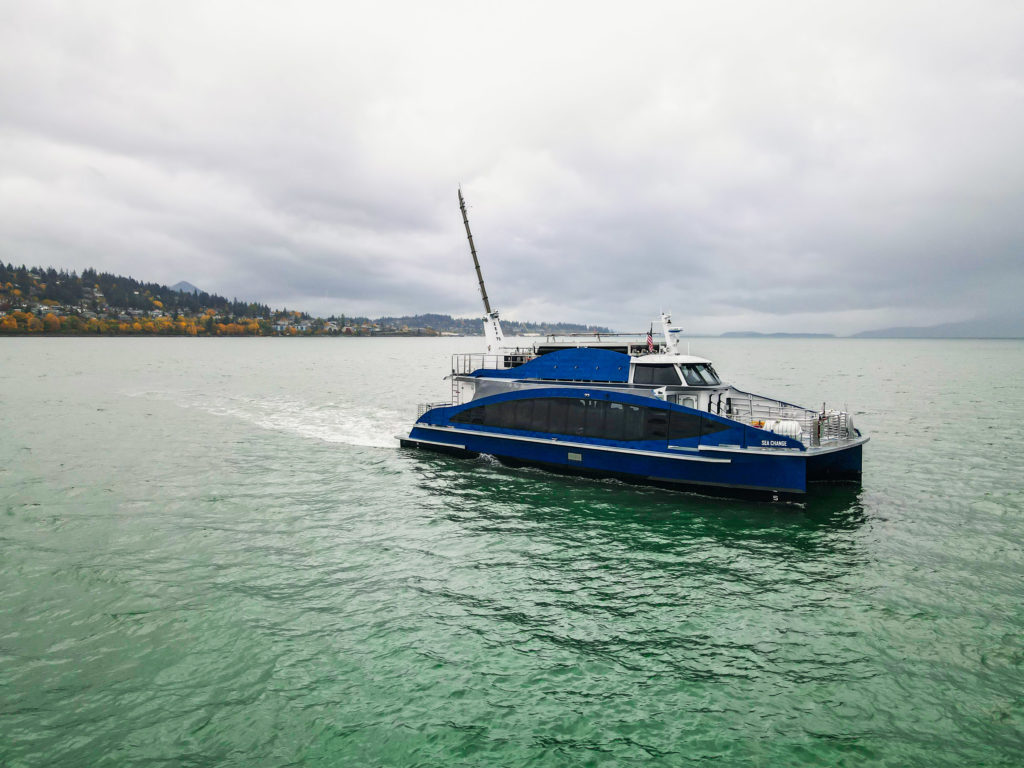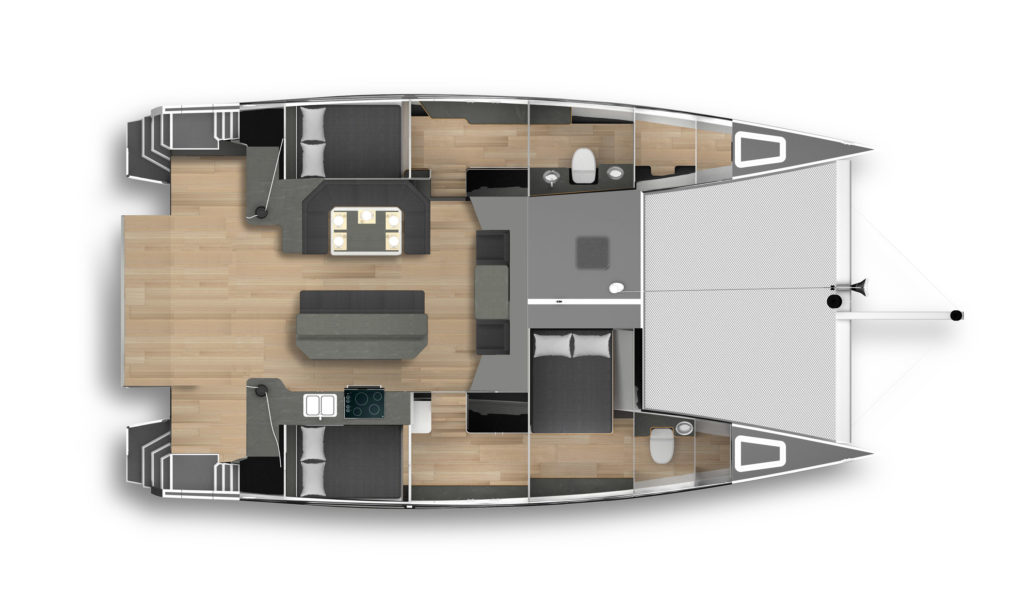Third Wave Crests for Maritime Blue Innovation Accelerator
Pacific Northwest entrepreneurs were featured heavily in the latest batch of new companies chosen for the third wave of participants in the Maritime Blue Innovation Accelerator program. A total of 10 startups, seven of them based in the Northwest, were picked as participants in what the program refers to as the “third cohort,” which will receive assistance in growing their innovative ideas via venture capital investments, co-working space opportunities, workshops, and access to mentors and advisors in their fields. The accelerator program for this cohort is estimated to last over a period of four months.
Co-sponsored by the Port of Seattle and the Washington State Department of Commerce, the accelerator, now in its third year, was formed to promote the growing maritime economy across the region. The diversity of business fields covered in this cohort—from digital technologies to sustainably sourced foods to engine innovations—is representative of the wide-ranging scope of the “blue” economy.
The locally based participants in the third cohort include:
- Adhere Gear (adheregearpodpaq.com): This Portland-based company provides smart cargo communication systems that track ocean container manifests to prevent supply chain bottlenecks.
- Blue Dot Kitchen (seacharrones.com): This Bainbridge Island operation makes vegan snack foods with kelp sustainably sourced from the Salish Sea.
- Carbon Orca (carbon-orca.myshopify.com): A Seattle-based manufacturer of electric hydrofoil boards.
- Duplex M (tech-viking.com): A new project for Anacortes-based firm Tech-Viking that makes digital tools to track accurate energy consumption information for battery-powered technologies.
- Photon Marine (photonmarine.com): A new Portland company that makes electric outboard engines for fleet vessels.
- Sea Potential (letsseapotential.com): A provider of diversity training in the Seattle and Tacoma maritime industries.
- Steamchain (steamchaincorp.com): This Beaverton, OR-based company simplifies global B2B payments via a smart contract platform that automatically converts currencies and reduces rate fluctuation.
For a more detailed list of all 10 of the selected Third Wave companies, go to the Maritime Blue Accelerator page at: maritimeblue.org/third-wave/.
Bellingham Firm Begins Sea Trials for Zero-Emissions Fuel-Cell Ferry

All American Marine, a Bellingham-based boat builder, began sea trials at the end of 2021 for the first hydrogen-powered, zero-emissions passenger ferry to operate in the United States. Named the Sea Change and operated by Switch Maritime, the high-tech, 70-foot catamaran is expected to begin operations this spring in San Francisco Bay.
With a capacity of 75 passengers, the twin-hulled Sea Change is powered by hydrogen fuel cells developed by California-based Zero Emissions Industries. The fuel cells produce 360 kW of electricity and are integrated with 100 kWh of a lithium-ion batteries for the vessel’s BAE Systems electric propulsion powertrain. Using this system, the ferry can reach a top speed of 18 mph and has an estimated range of 300 miles. The concept for the hydrogen-oxygen, fuel-cell technology that powers the Sea Change is nearly a century old, but its use has grown in recent years for its ability to produce low-cost electricity from electrochemical reactions that emit only warm water as a byproduct.
Once it completes its shakedown cruises this year in Bellingham Bay and the Bay Area, the Sea Change could become a pioneering example of commercial green technology usage in the global maritime industry, which is currently responsible for about 3% of worldwide greenhouse gas emissions each year. As the fuel-cell trials continue, All American Marine said it is working on building other fuel-cell and hybrid-electric vessels for the U.S. Coast Guard. Switch Maritime, based in Norwalk, CT, said it wants to work with existing ferry owners around the country to help “de-carbonize” the nation’s older, diesel-powered commercial boats. While neither All American nor Switch has current plans to expand fuel-cell ferry technology in the Puget Sound area, Washington State Ferries (WSF) said it plans to begin construction of its first hybrid-electric, Olympic-class ferry this year, with an estimated launch target of 2025. WSF also said it expects to begin converting its three aging Jumbo Mark II vessels to hybrid-electric power in 2022.
For information on the Sea Change, and on All American Marine, go to: allamericanmarine.com.
New Whitacre 47 Cat Nears Completion for June Release

A new line of live-aboard catamarans will soon be plying the waters of Puget Sound, created by a partnership of boat builders in Anacortes called Whitacre Catamarans. The limited edition Whitacre 47 cat will be the group’s first production model and is expected to debut in June.
The Whitacre Catamaran team said the 47 will be a “competitively priced entry” to the fast-growing global catamaran market. Once completed, the eco-engineered vessel will be packed with low-carbon features, such as hybrid-electric/diesel propulsion and battery-powered systems that can be charged with solar energy. The team is also beginning working on the design for a smaller cruising cat, the Whitacre 42.
Unlike similar large, twin-hulled boats designed by European and South African builders for the Caribbean charter market, the Whitacre 47 has been designed and tooled specifically for year-round, northern latitude cruising, the team said. The 47 offers a wide range of ample interior layouts and high-efficiency electrical and mechanical systems for potential liveaboard use. The use of composite construction will reduce the craft’s weight but make it reliably strong and durable enough to exceed strict CE Offshore standards.
The collaboration was formed by two legendary boat designers, Hal Whitacre of Whitacre Yacht Design, and James Betts of Betts Boats. The two engineers also joined with Mike Mullenberg of Pacific Cruising Yachts and TC Skeels and Kelly Rinehart of Bug House Yachts to help bring the all-season catamaran to life. Before he began working on the Whitacre 47, Hal Whitacre completed a seven-year contract with catamaran builder Gunboat at its North Carolina boatyard, focusing on the Gunboat 55 and 78 models.
As a fun bonus, Whitacre Catamarans also makes it possible to witness the progress of the 47’s construction through a series of behind-the-scenes videos on its Build Blog. Learn more about the 47 and check out the boat’s progress on the company’s website at: whitacrecatamarans.com.
Glidden to Replace Departing Jones at Elliott Bay Marina
After being purchased by Southern Marinas Holdings II last year, Elliott Bay Marina is facing another sea change in its leadership as it welcomes Jordan Glidden as its new general manager.
Glidden replaced Dwight Jones, who stepped down as the marina’s general manager on January 21st to pursue ownership of another Seattle marina (a big congrats to him!). Jones has worked at Elliott Bay Marina since its inception nearly 30 years ago.
A statement released by Elliott Bay Marina staff described Glidden as an active member of the Seattle maritime industry, who spent the last eight years “in a variety of positions, understanding the complexities of Elliott Bay’s operation and establishing great relationships with all our members.” Additionally, Dennis Halpin, the marina’s current assistant Harbormaster, will assume the role as Harbormaster previously held by Glidden.
For more information on the marina, go to: elliottbaymarina.co.